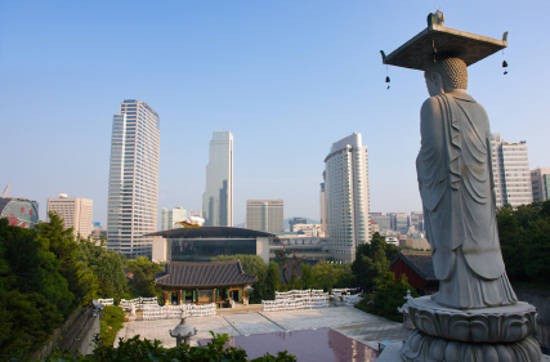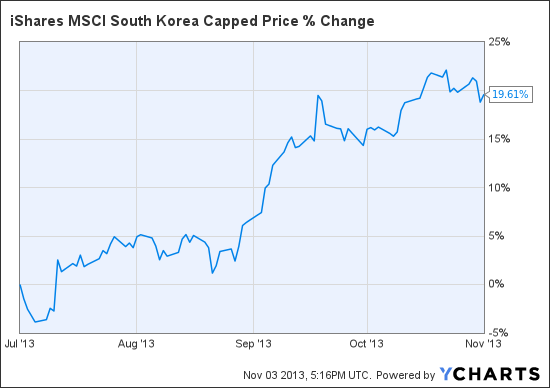Why South Korea Belongs In A Developed Market ETF
Post on: 6 Апрель, 2015 No Comment

When considering the equity allocation of an investor portfolio, perhaps the most common bifurcation made is between developed and emerging markets. The distinction between developed and emerging markets has become a hot topic in recent years thanks to the tremendous gaps in growth and risk between the two groups. As developed markets have struggled to get on track thanks to mounting debt burdens and rising unemployment, emerging markets have raced ahead and posted eye-popping growth figures thanks to favorable demographic shifts and a swelling middle class.
To many investors the distinction between these two asset classes may seem straightforward. Developed markets are advanced economies with higher quality of life, sophisticated financial markets, and generally wealthier populations—such as the U.S. and Western Europe. Emerging economies are home to financial markets with fewer investor protections and standardized processes and to populations that tend to be less educated and more rural.
But determining exactly what qualifies as an emerging market can be a tricky task. Just as there are many shades of gray, there are various points along the emerging/developed spectrum. Moreover, different organizations have different criteria for evaluating the status of an economy, and metrics such as full convertibility of the local currency can play a big role in determining an economy’s status.
Over the last several years many investors have embraced ETFs as the preferred vehicle for accessing emerging markets. And as a result, index providers have become the voices of authority in determining whether a country falls into the developed, emerging, or frontier bucket. In most cases, the decision is unanimous. Few would argue that the U.S. is a developed market while China and Brazil are emerging. But some decisions seem a bit strange, seemingly not reflecting economic realities.
For example, Chile is often classified as a “frontier” market despite the fact that it has a per capita GDP higher than almost any country in South America, extremely low public debt levels, and a democratic government. Chile’s economic growth potential and risks may be more similar to Brazil, but as far as some indexes are concerned the country belongs in the same bucket with the likes of Nigeria or Bangladesh [see Emerging Market ETFs: Seven Factors Every Investor Must Consider ].
Another controversial classification arises in South Korea, one of the largest country representations in the MSCI Emerging Markets Index that serves as the basis for several of the largest funds in the Emerging Markets Equities ETFdb Category. While South Korea definitely fit the emerging market profile several decades ago, it is hard to argue that such a classification is still warrantedespecially given the incredible development of the market over the years. The country has gone from a level of economic development on par with nations in Africa and Central America to become a dynamic, high tech powera sort of Asian Germany in the technology sector.
Despite these advancements, Korea maintains the same status as economies that are literally decades behind in terms of economic development. This has a potentially important impact on investors who utilize ETFs to achieve emerging markets exposure, as these products may maintain big weightings towards stocks that belong in the developed bucket. Below we highlight several key reasons why Koreaby any reasonable measurementis not an emerging market, and provide some ideas for tweaking portfolio exposure to reflect a more appropriate allocation to the true emerging markets [read ETF Plays On The Next Developed Markets ].
High Tech, Innovation Based Economy
A hallmark of emerging economies historically has been a focus on one of two industries: mineral mining and low skill manufacturing. South Korea has neither; the country has limited natural resources and the manufacturing prowess is limited to high tech goods and automobilestwo sectors that are heavily dependent on not only automation, but technological innovation in order to stay relevant in an increasingly globalized world.
This is in sharp contrast to the worlds truly emerging markets of China or Indonesia. where low-skill manufacturing dominates based on the sheer number of people in the country. Meanwhile the exact opposite could be said about the Korean market, which continues to invest in technology and is home to a shrinking, well-educated population.
Korea leads the world with the highest percentage of households with access to the internet at 94.3%. More than four-fifths of the population has access to home computers, and the country currently has the highest average download speeds, more than 3.5x faster than the U.S. average. These stats underscore the technological divide not only between South Korea and emerging economies such as Brazil and China, but between Korea and advanced economies as well. Korea is on the cutting edge of the technological revolution, one piece of evidence of advanced status.
High Growth Rate Does Not Mean Emerging Market

Some might point to Koreas high growth ratein excess of 6% for 2010as a reason for its inclusion among the emerging markets. In recent years especially, emerging countries have shown impressive economic expansion while developed markets have grown at an extremely slow rate. But while the U.S. and much of Europe is struggling to get out of first gear, there are a number of advanced economies that are performing quite well. Hong Kong and Singapore, for example, are two such countries with growth rates in excess of 5% that few would argue are home to developed economies. If it walks like an emerging market and grows like an emerging market…it might actually be a developed market [also read ETFs For The Next 11 Economies ].
Robust Trade
Another characteristic of developing countries is a lack of trade with other nations. While China is an obvious exception to this rule, many other emerging economies do not engage in meaningful bilateral trade, beyond shifts of differing types of key resources such as oil or food. South Korea has a population of just under 49 million peoplemaking it the 26th most populous countrybut it in the top ten for dollar value of both exports and imports. This suggests that the country is a highly connected and integral part of the global economy. No other emerging market of its size in the world can lay claim to this and especially not similarly sized countries such as South Africa or Colombia [see Free Trade Agreement Puts South Korean ETFs In Focus ].
Demographics
If any one statistic confirms South Koreas developed status it could be the extremely low birth rate. Arguably the one key characteristic that virtually all emerging markets have in common is a rapidly growing and urbanizing population that is headed towards reaching a peak earnings power over the next few decades. But in Korea the average fertility rate is just under 1.2 children born per womanfar below the replacement rate and suggesting a shrinking population that is more characteristic of developed markets. In fact, according to the CIA World Factbook. global fertility rates are in general decline and this trend is most pronounced in industrialized countries, especially Western Europe, where populations are projected to decline dramatically over the next 50 years. [read Three International ETFs Facing Shrinking Populations ].
Comparing other metrics shows that South Korea is much closer to the U.S. in terms of economic development than it is to the BRIC economies. South Korea’s per capita GDP is about 400% that of China, and the 99% literacy rate is among the highest in the world. The Human Development Index (HDI) is another interesting metric to consider; this score is composed of data on life expectancy, education, and gross national income to rank nations by level of “human development.” South Korea maintains the 12 th highest HDI score, coming in ahead of Switzerland, France, the United Kingdom, and many others. China comes in 89 th on the list, while Brazil ranks 73 rd and India 119 th .














